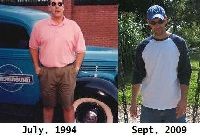Because of my scale's inconsistencies in measuring body fat, nowadays I'm trying to concentrate more on my actual body weight, my waist and a few other measurements, and my accomplishments with lifting weights. If my lifts begin to improve steadily as I eat more, my body weight goes up, and my 34's still fit comfortably around my waist, I can't possibly be getting fatter. At least not at a ratio of 4 to 1 in favor of fat.
Scales can be frustrating. They can even cause one to fall off the diet wagon. It's why I highly recommend not weighing yourself more than once a week. And even then do not panic if something looks out of whack. You've got to give yourself at least a 3 week evaluation before making changes. How you look, your measurements, and how your clothes fit are a far more accurate way to determine progress. If the scale says you've gained 5 pounds but your pants actually fit better, ahem. Let's use our brains, shall we?
In addition, I found this article regarding children and neck sizes interesting enough to pass along to the loyal readers of The Magic Pill:
Neck size and childhood obesity
The reason this caught my eye is because of an alternative method I have used recently to calculate my alleged body fat, compliments of the U.S. Navy:
Body fat method of the U.S. Navy
It's a very basic and stripped down way to calculate what is realistically only an estimation of body fat percentage based on measurements, body weight, and gender. Note that the neck measurement is used for both male and female. Using this method about 6 weeks ago, my body fat was measured at 13.4%. Maybe that's too low, but you can see now why I joked in a previous entry that my body fat was somewhere between 13% and 23%. Who knows? But this Navy method of calculating body fat is right in line with what I mentioned earlier: use measurements as your main source of judging progress rather than just a scale. If my body weight goes up with this Navy method but my waist (abdomen) measurement stays virtually the same, my body fat percentage will not be going up much, if at all.


No comments:
Post a Comment